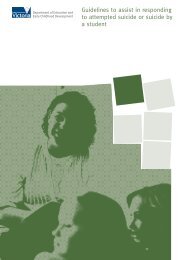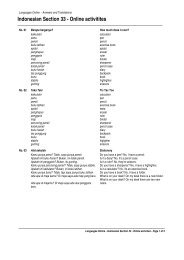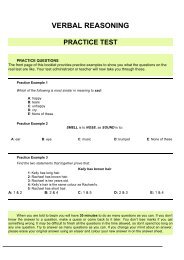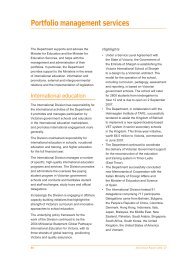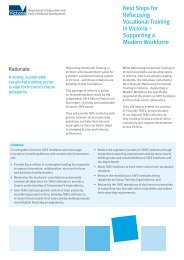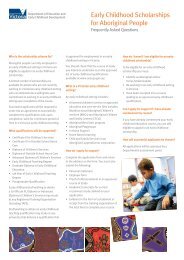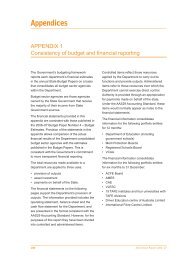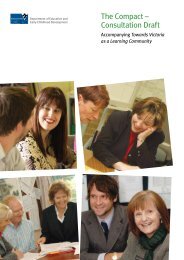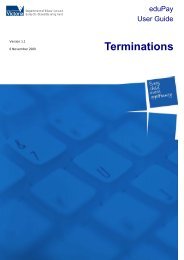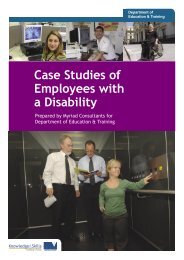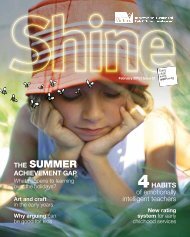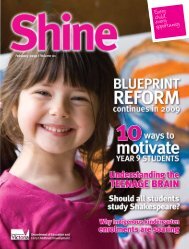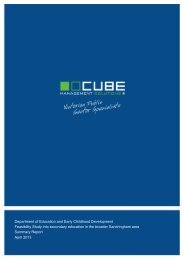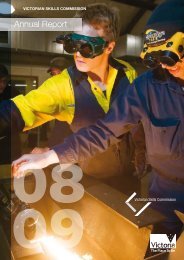November 2009 Vol. 1, Issue 10 (PDF - 16.2Mb) - Department of ...
November 2009 Vol. 1, Issue 10 (PDF - 16.2Mb) - Department of ...
November 2009 Vol. 1, Issue 10 (PDF - 16.2Mb) - Department of ...
Create successful ePaper yourself
Turn your PDF publications into a flip-book with our unique Google optimized e-Paper software.
66 Nov 09<br />
Early Childhood<br />
Environmental education<br />
in early childhood<br />
There<br />
Environmental Education in Early Childhood<br />
Victoria (EEECV) helps early childhood<br />
pr<strong>of</strong>essionals incorporate sustainable education<br />
principles into their daily program. EEEC is<br />
a not-for-pr<strong>of</strong>it organisation that promotes a<br />
holistic approach to environmental education<br />
and sustainable practices in early childhood<br />
and the early years <strong>of</strong> primary school. Its<br />
approach involves policy development,<br />
housekeeping practices, play and learning<br />
experiences, and strategies for working with<br />
children, staff and parents.<br />
EEEC provides a range <strong>of</strong> services including<br />
pr<strong>of</strong>essional development, access to the<br />
latest in sustainable research, and advice on<br />
implementing sustainable practices within<br />
a workplace. Its resource centre in Preston<br />
also sells play materials, children’s books and<br />
pr<strong>of</strong>essional sustainability texts and electronic<br />
training resources.<br />
Stephanie Ralton from EEEC has also been<br />
working with the Centre for Education<br />
and Research in Environmental Strategies<br />
(CERES) to develop and facilitate early<br />
childhood incursion programs on waste,<br />
recycling, worms, compost, gardening, energy,<br />
minibeasts and water.<br />
She says the incursions provide a great<br />
opportunity to talk to young children in<br />
fun and interactive way that helps them<br />
better understand their impact on the<br />
environment.“We use lots <strong>of</strong> using props<br />
and songs, and the children really enjoy it,”<br />
she says. “For example, when we talk about<br />
the water cycle we use a big tub <strong>of</strong> water to<br />
simulate a dam and we talk about how the<br />
water gets to the city, and we hook up a pipe.<br />
“Then, we talk to the kids about what they<br />
use water for and one at a time they come up<br />
and use a prop, such as a cup or a showerhead,<br />
and they watch as the water level drops until<br />
eventually by the time the last child has a turn,<br />
there is no water left. It is a hands-on way<br />
for them to see how they can impact on the<br />
environment, and it opens up discussion about<br />
ways we can save water,” she says.<br />
are two remaining EEEC sessions<br />
for <strong>2009</strong>:<br />
Child-safe and Sustainable Cleaning in Children’s<br />
Services, with Bridget Gardner, on Wednesday<br />
4 <strong>November</strong> 1.30pm–4.00pm; and<br />
Beyond the Water Tank: Taking sustainable<br />
education to the next level, with Tracy Young,<br />
on Friday 13 <strong>November</strong> 1.30pm–4.00pm.<br />
Pr<strong>of</strong>essional development opportunities<br />
for 20<strong>10</strong> include:<br />
Forest Schools – Australian Perspective:<br />
a visit to St Leonard’s Early Learning Centre<br />
(Bangholme campus) to see the program in<br />
action and discover how the forest schools<br />
<strong>of</strong> Scotland and Denmark have influenced<br />
their practice.<br />
Linking the Early Years Learning Framework<br />
and Education for Sustainability: What is<br />
sustainability and education for sustainability,<br />
why is it important in the early years, and<br />
how can it be linked to the Framework and<br />
incorporated into daily practice?<br />
Early Years Science: Brush up on sustainabilitylinked<br />
science concepts that are appropriate for<br />
the early years and discover practical ways to<br />
incorporate elements in the program through<br />
hands-on investigation.<br />
Wire and Recycled Materials: Explore creative<br />
ways to use wire and recycled materials while<br />
reflecting on the 4Rs – Rethink, Reduce, Reuse,<br />
Recycle.<br />
Gardening with Children: Investigate the<br />
advantages <strong>of</strong> gardening for children, discover<br />
where to start, what to do and how it can be<br />
linked with the early years program.<br />
For more information, visit www.eeec.org.au<br />
Carrington Financial<br />
Services<br />
We <strong>of</strong>fer<br />
n Salary Sacrifice<br />
n Novated Lease<br />
n 54.11 Resignation<br />
n Retirement Planning<br />
n Wealth Creation<br />
n Taxation<br />
n Estate Planning<br />
For a no obligation assessment <strong>of</strong> your situation<br />
Contact John Doyle or Diana Sangue<br />
on (03) 9820 8688



